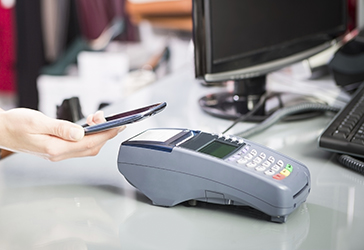
Digital and mobile wallets have become quite popular among smartphone users in recent years. Digital and mobile wallet payments are becoming the way of the future as the number of users continue to climb day by day. Below we will go over the basics of digital and mobile wallets to help with your decision-making.
What is a Digital and Mobile Wallet?
A digital or mobile wallet, also known as an e-wallet, is precisely that. It is a wallet located digitally within a device, such as a smartphone or a smartwatch. Most require network connectivity for digital or mobile payment capabilities.
There are many popular mobile wallets such as:
- ApplePay
- GooglePay
- SamsungPay
These digital and mobile wallets store your credit or debit card information within their database to allow for a more secure, convenient checkout option. Many retailers now have the opportunity to "scan and pay," meaning you scan your digital or mobile wallet, eliminating the need to carry your physical wallet with you.
Are They Secure?
A digital and mobile wallet is often more secure than carrying your physical wallet containing your debit card, credit cards, or even cash you may have on you. These mobile payments are encrypted, meaning the application does not actively store your actual credit/debit card number or account number.
If your phone is lost or stolen, a digital wallet is much safer than if it were your physical credit or debit cards. The payment information you enter is only accessible to authorized users such as yourself and a company representative.
Using a Digital and Mobile Wallet
Determining which digital or mobile wallet to use often is determined by which brand of smartphone or device you are using, whether it be an iPhone, Android, or other manufacturer. With an iPhone, many users opt for ApplePay, while those with an Android or other smartphone tend to use GooglePay or SamsungPay.
Once you have chosen your desired digital wallet, you will begin entering your personal information, such as your name, date of birth, and address. Once you have completed this step, you will enter the credit or debit card information you wish to use within the application. Your card or account information, whichever you choose to use, will immediately be encrypted within the application's database for your use only.
Using the digital wallet, you can send money directly to a family member, friend, or retailer. The application uses a technology known as near-field communication, meaning it uses radio frequencies to communicate between the two allowing for a successful payment to a retailer.
Not all smartphones utilize near-field communication systems. If your phone does not allow near-field communication, you can often still use a digital wallet.
Not all retailers support mobile payment capabilities; however, you can quickly determine if the retailer of choice can submit your mobile payment by checking the point-of-sale system for the mobile payment indicator. You also may ask a store associate if they accept mobile payments.
What Else Can They Do?
A digital and mobile wallet offers more than just convenient payment options. You can also store boarding passes, hotel reservations, concert tickets, coupons, and other card information.
Takeaway
A digital wallet, or e-wallet, is a secure payment option that holds your encrypted credit, debit, or banking account number securely within the application's database for a safe, convenient checkout. With more smartphone users utilizing this option each day, more and more retailers will allow this payment method to be an option at checkout.





